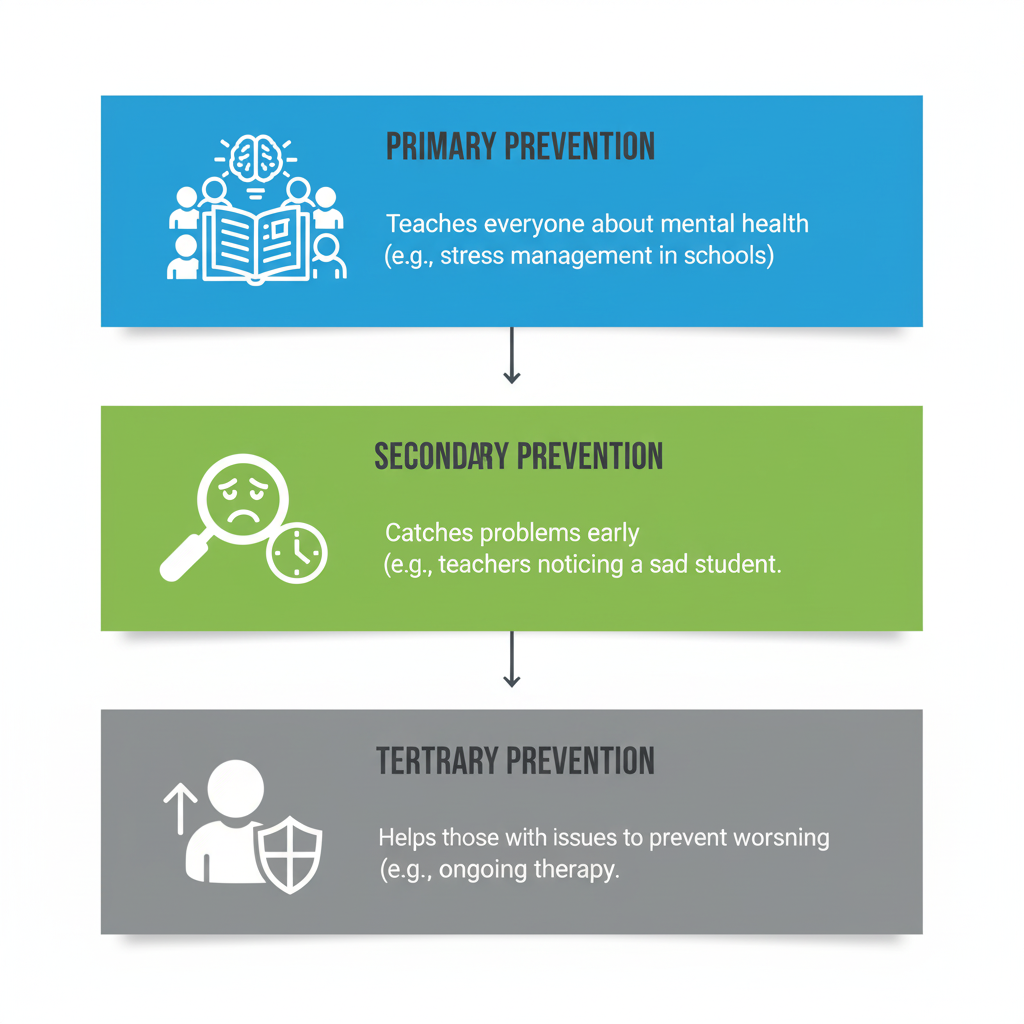Mental health matters more than ever. People around the world face growing mental health challenges. This makes prevention vital. We need to stop problems before they start.Mental health prevention helps people stay healthy. It builds stronger communities. The website DrMorepenHome.com works to support health and wellness. They know prevention works better than waiting for problems to grow.Let's explore ways to keep minds healthy. These strategies work for everyone - kids, adults, and whole communities.
What is Mental Health Prevention?
Mental health prevention stops problems before they begin. It's like wearing a helmet when riding a bike. You protect yourself before getting hurt.
There are three main types:
Primary Prevention:
This teaches people about mental health. Schools might run programs about handling stress. Communities share information about staying mentally healthy.
Secondary Prevention:
This catches problems early. Teachers might notice a student seems sad all the time. They can get help quickly before things get worse.
Tertiary Prevention:
This helps people who already have mental health issues. It stops problems from getting bigger. It prevents people from getting sick again.

Think of a school program that teaches kids about bullying. This works at all three levels. It teaches everyone, helps kids in trouble, and supports those who were hurt.
Why Mental Health Nurses Matter
Nurses play a big role in keeping minds healthy. They work on the front lines. They see people every day and can spot problems early.

Nurses help by:
- Teaching people to notice when they feel bad
- Showing healthy ways to live
- Checking for mental health problems
- Helping people learn to handle stress
When nurses focus on prevention, fewer people get really sick. This helps everyone and saves money too.
Building Strong Minds and Communities
Making Minds Stronger
We can build mental strength like we build muscle strength. This means teaching people skills before they need them.
Awareness campaigns teach communities about mental health. Workshops show people how to manage stress. Support groups help people feel less alone.
Stopping Problems Early
Prevention finds risks and reduces them. Good policies protect people from things that hurt mental health. Communities need easy access to help when people need it.
Early help programs work great. When schools help students who seem stressed, those kids do much better later.
%20(1).png)
Teaching About Mental Health
Education Comes First
Teaching people about mental health removes fear and shame. When people understand mental health, they talk about it more openly.
Good education happens through:
- Workshops that teach stress management
- School programs for young people
- Community events that bring people together
Using Social Media
Social media reaches many people quickly. Mental health campaigns on Facebook, Instagram, and Twitter teach important lessons. People can share their stories and help each other.
Online support groups make help available anytime. DrMorepenHome.com could add mental health resources to help even more people.
Creating Safe Spaces
Building Support Everywhere
Safe environments help prevent mental health problems. Workplaces, schools, and families all need to support mental health.
Companies can train mental health champions. Communities can host regular meetings about mental health. Families can talk openly and teach kids how to cope with stress.
Making Help Easy to Find
People need different kinds of support. Online counseling helps those who can't travel. Local support groups give people places to meet face-to-face.
DrMorepenHome.com already helps with health and wellness. Adding mental health support would help even more people.
Teaching People to Bounce Back
Building Personal Strength
Resilience means bouncing back from hard times. We can teach this skill to everyone.
Mindfulness training helps people stay calm. When schools and workplaces teach these skills, people handle stress better. Focusing on strengths instead of weaknesses makes people feel more confident.
Strong Relationships Help
Good relationships protect mental health. Peer mentorship programs connect people who can help each other. When families and friends talk openly about feelings, everyone benefits.
.png)
Finding Problems Early
Regular Check-ups for Minds
Just like we check our bodies for health problems, we need to check our minds too. Schools and workplaces can do simple mental health check-ups.
These check-ups should be private and safe. People need to feel comfortable being honest about how they feel.
Quick Help When Needed
When problems are found early, quick help makes a big difference. Therapists can teach coping skills. Crisis hotlines provide immediate support.
Technology Helps Too
Mental health apps can track moods and suggest helpful activities. Video calls with therapists make help available from home. These tools make mental health support easier to get.
Moving Forward Together
Mental health prevention works. When we teach people about mental health, create supportive environments, and catch problems early, fewer people suffer.
Everyone has a role to play. Nurses, teachers, families, and companies like DrMorepenHome.com all contribute. Together, we can build communities where mental health is valued and protected.
Prevention saves lives and creates happier, healthier communities. By working together, we can make mental health a priority for everyone.
FAQ
What simple things can I do for my mental health?
Exercise regularly, eat good food, and get enough sleep. Practice deep breathing or meditation. Build strong friendships. Ask for help when you need it.
How are building mental health different from preventing problems?
Building mental health makes people stronger before problems start. Prevention looks for risks and stops them. Both work together to keep people healthy.
How can schools help prevent mental health problems?
Schools can teach about mental health in classes. They can watch for students who need help. Creating safe, supportive environments helps all students feel better.
How can I help someone with mental health struggles?
Listen without judging. Be patient and kind. Encourage them to get professional help. Stay connected and show you care.
Why does removing shame around mental health matter?
When people feel ashamed, they don't ask for help. Removing shame helps people get support sooner. This leads to better outcomes for everyone.
.png)



.png)
.png)
.png)
.png)
.png)
.png)
.png)

.png)
.png)
.png)

.png)
.png)
.png)
.png)
.png)
.png)

.png)
.png)

.png)
.png)
.png)

.png)

.png)


.png)







